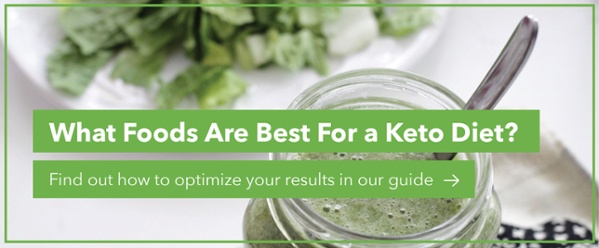.jpg?width=750&name=word-keto-made-from-green-leaves_t20_1QJLrV%20(1).jpg)
When most people think of dieting, they think of caloric restriction: You eat less food and resign yourself to feeling hungry all the time. Not surprisingly, diets that limit your calories are almost always doomed to failure. And if you did manage to lose weight, the chances are that you'll gain it back—and then some—when you go off the diet.
The way out of diet frustration isn’t more caloric restriction. Instead, reframe how and when you get your calories. I’ve had excellent success with my clients when we give up on diets that count calories and fat grams and make them feel deprived and switch to a combination of intermittent fasting and the ketogenic diet. Each eating approach can work well on its own, but we get a synergistic effect when we put them together. One plus one equals far more than two.
Intermittent Fasting
Intermittent fasting means fasting for between 14 and 16 hours straight and eating only during the window of eight to 10 hours between breakfast and your evening meal. When the window closes, you don’t eat again until it opens again. You’ll go for at least 14 hours without eating. During that time, you’re encouraged to drink all the water, tea, herbal tea, and black coffee you want. Crucially, you don’t cut calories during the eating window.
At first, the idea of going that long without eating is horrifying. In our food-saturated society, most people rarely go for more than a few hours without eating. Most Americans consume at least half their daily calories in the evening, starting with dinner and continuing with snacks until bedtime.
When you don’t eat for at least 14 hours, you force your body to use up all its readily available calories—the blood sugar in your circulation. Near the end of your fasting period, your body will probably need to tap its stored glucose (glycogen) and fat. Intermittent fasting can lower your fasting blood sugar, reduce your insulin resistance, and reduce your fasting insulin levels by 20 percent or more.[1]
The improvements in glucose metabolism from intermittent fasting are usually noticed within weeks or even days. Improvements in body composition take longer to appear but typically follow within a few months. But if you’re overweight, you may not lose a lot of weight, or even any, with intermittent fasting alone if you continue to eat a diet high in processed foods and sugar.

The Keto Diet
And that brings us to the ketogenic diet.
The keto diet is based on eating foods that are high in healthy fat while severely restricting carbohydrates. On the ketogenic diet, you aim to get at least 70 to 80 percent of your calories from healthy fat, 20 to 25 percent from lean protein, and only 5 to 10 percent (no more than 50 grams) from carbohydrates. The carbs are mostly restricted to leafy greens and berries; you don’t eat starchy vegetables, grains, beans, or most fruits. The goal is to get your body into a state of ongoing ketosis, where ketone bodies, not glucose, are burned for fuel.
The keto diet is a highly effective approach to weight loss and also has other significant health benefits. In particular, the ketogenic diet can help normalize blood sugar and metabolic syndrome by reducing insulin resistance. Why? Because when your carb intake is decreased, your body doesn’t need to deal with the high blood sugar carbs can cause.
At the start, however, the keto diet can be frustrating. Getting your body into ketosis and keeping it, there is a challenge. Many people experience “keto flu” when they begin the diet. You might feel lethargic, headachy, and even nauseous for a few days as your body adapts. The discomfort of keto flu is enough to make some people abandon the approach, but don’t give up too quickly. Supplements can be beneficial to get you through this period with minimum negative effects. (I’ll discuss the best supplements at the end of this blog.)
A bigger problem is getting your body to go into ketosis and stay there. Here’s where the synergy of intermittent fasting and the keto diet comes in.
Even when you’re not following any eating plan, when you wake up in the morning, you might already be in a state of mild ketosis. Your overnight fast may be long enough for your body to need to shift its fuel balance from carbs to fats. If you decide to follow intermittent fasting, the ketosis effect is amplified. You are very likely to be in mild ketosis when you wake up because you haven’t eaten since your evening meal the night before. By the time you wake up, you’ve probably been burning ketones for a couple of hours. When you eat your first meal of the day a few hours later, you’ve been burning ketones even longer.
So, intermittent fasting has already moved you in the direction of ketosis, but without making any significant dietary changes. You may have lost some weight or noticed some improvement in inflammation, but maybe not enough. It’s time to take the next step and combine intermittent fasting with the keto diet's power. You will almost certainly move into full ketosis and stay there with little effort. The synergy of the two approaches will help you see improvements in your health happen better, faster, and more sustainably. The combined approach gives results significantly better than either method alone: weight management, increased mental clarity, better glucose metabolism, better body composition, and normal inflammation.
Supplements for Synergy
The keto diet is a significant change in the way you eat. Especially at the start, nutritional supplements to help you get into ketosis can be beneficial.[2] Here’s what I suggest:
Keto-BHB Benefits™. A choice adjunct for those embarking on an intermittent fasting/ketogenic diet journey. This supplement contains beta-hydroxybutyrate, or BHB, one of the main ketone bodies produced by your body when you’re in ketosis. Your body burns BHB instead of glucose when you’re in ketosis. Using this supplement can help give you extra energy, especially during the first days of following the keto diet.* The formula also includes nine amino acids for extra protein and curcumin for extra free-radical fighting power.* The powder can be added to food or used in a shake or smoothie.
Chromemate™. Chromium increases the production and release of the glucose transport molecule called GLUT-4 and also increases the production of GLUT-4 enzymes in the liver and muscles.* This chromium polynicotinate supplement supports glucose metabolism, helps the body build lean muscle mass, and helps metabolize fat more efficiently.*
Tonalin®. Conjugated linoleic acid (CLA) helps the body metabolize existing fat deposits to be used as energy.* It helps reduce fat and increase lean muscle mass.* CLA also helps support normal blood glucose.* Tonalin also boosts your metabolism and helps keep new fat cells from forming.*
Alpha Lipoic Acid 300. A unique and powerful free-radical fighter that has both water- and fat-soluble properties in the cell, Alpha-lipoic acid (ALA) supports healthy glucose metabolism.* It protects your cells against free radical damage from ketosis byproducts.*
Brain Benefits™. Omega-3 supplements are one of the essential supplements for staying in ketosis. Omega-3s contribute to the ketogenic diet’s high fat intake requirement. The omega-3 fatty acids EPA and DHA in this supplement aren’t just for supporting memory, focus, and mood—they’re valuable for supporting heart health, a robust immune system, and healthy joints.*
Vegan Protein. Made from a blend of pea, flax, and hemp protein with added probiotic support, this powder is available in vanilla and chocolate flavors. It’s ideal for the keto diet because it’s a pure protein with no carbohydrates. Add it to shakes and smoothies.
Dr. Rob Silverman

[1] Barnosky AR, Hoddy KK, Unterman TG, Varady KA. Intermittent fasting vs. daily calorie restriction for type 2 diabetes prevention: a review of human findings. Transl Res. 2014;164(4):302-311. DOI:10.1016/j.trsl.2014.05.013
[2] Harvey CJDC, Schofield GM, Williden M. The use of nutritional supplements to induce ketosis and reduce symptoms associated with keto-induction: a narrative review. PeerJ. 2018;6:e4488. Published 2018 Mar 16. DOI:10.7717/peerj.4488







.jpg?width=750&name=word-keto-made-from-green-leaves_t20_1QJLrV%20(1).jpg)



-1.jpg)

-1.jpg)




